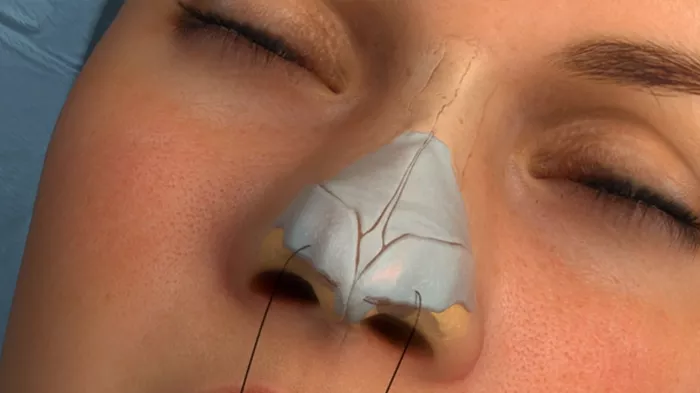Rhinoplasty, commonly known as a nose job, is a popular cosmetic surgery procedure that can improve the appearance and function of the nose. One of the common concerns among patients undergoing rhinoplasty is how long they should avoid wearing glasses after the procedure. In this article, we will explore the timeline for wearing glasses after rhinoplasty and what patients can expect during the healing process.
What is rhinoplasty?
Rhinoplasty is a surgical procedure that is performed to reshape the nose. It can be used to improve the appearance of the nose, correct structural abnormalities, or improve breathing function. Rhinoplasty can be performed using different techniques, including open rhinoplasty and closed rhinoplasty.
During an open rhinoplasty, a small incision is made on the outside of the nose, while a closed rhinoplasty involves incisions made inside the nostrils. The technique used will depend on the patient’s specific needs and the surgeon’s preference.
How does rhinoplasty affect wearing glasses?
Rhinoplasty can have a significant impact on wearing glasses. The procedure can change the shape and size of the nose, which can affect how glasses fit on the face. In addition, wearing glasses after rhinoplasty can put pressure on the nose, which can cause discomfort and delay the healing process.
For these reasons, patients may need to avoid wearing glasses for a period of time after rhinoplasty to allow for proper healing and to ensure optimal results.
How long can you not wear glasses after rhinoplasty?
The timeline for when patients can resume wearing glasses after rhinoplasty can vary depending on the extent of the procedure and the individual’s healing process. In general, patients should avoid wearing glasses for at least 4-6 weeks after rhinoplasty.
During the first few weeks after the procedure, the nose will be swollen and tender, and wearing glasses can put pressure on the nose and delay the healing process. In addition, glasses can cause indentations or marks on the nose, which can affect the final results of the procedure.
After the initial healing period, patients may be able to wear glasses with the help of special devices, such as tape or pads, to prevent pressure on the nose. However, it’s important for patients to follow their surgeon’s instructions for postoperative care and to avoid wearing glasses until they are cleared to do so.
What can patients do to avoid wearing glasses after rhinoplasty?
There are several things that patients can do to avoid wearing glasses after rhinoplasty. These include:
Using contact lenses: Patients can use contact lenses instead of glasses during the healing process to avoid putting pressure on the nose.
Using special devices: Patients can use special devices, such as tape or pads, to prevent pressure on the nose when wearing glasses.
Avoiding activities that may cause the glasses to slip: Patients should avoid activities that may cause the glasses to slip, such as bending over or engaging in strenuous exercise.
Being patient: It’s important for patients to be patient during the healing process and to follow their surgeon’s instructions for postoperative care to ensure optimal results.
Considering alternative options: In some cases, patients may be able to undergo a non-surgical rhinoplasty procedure, such as dermal fillers, to improve the appearance of the nose without the need for glasses.
Discussing options with the surgeon: Patients should discuss their options for avoiding glasses with their surgeon before the procedure to ensure that they are fully prepared for the recovery process.
What are the risks of wearing glasses after rhinoplasty?
Wearing glasses too soon after rhinoplasty can cause several complications. These include:
Pressure on the nose: Wearing glasses can put pressure on the nose, which can cause discomfort and delay the healing process.
Indentations or marks on the nose: Glasses can cause indentations or marks on the nose, which can affect the final results of the procedure.
Infection: Wearing glasses too soon after rhinoplasty can increase the risk of infection.
Delayed healing: Wearing glasses too soon after rhinoplasty can delay the healing process, which can affect the final results of the procedure.
Compromised results: Wearing glasses too soon after rhinoplasty can compromise the final results of the procedure, which can be disappointing for patients.
What should patients expect during the healing process?
The healing process after rhinoplasty can vary depending on the extent of the procedure and the individual’s healing process. In general, patients can expect the following during the healing process:
Swelling and bruising: The nose will be swollen and bruised for several weeks after the procedure. This is normal and will gradually improve over time.
Discomfort: Patients may experience some discomfort during the healing process, which can be managed with pain medication.
Limited activity: Patients will need to limit their activity during the healing process to avoid putting pressure on the nose.
Follow-up appointments: Patients will need to attend follow-up appointments with their surgeon to monitor their progress and ensure that they are healing properly.
Patience: It’s important for patients to be patient during the healing process and to follow their surgeon’s instructions for postoperative care to ensure optimal results.
Conclusion:
Rhinoplasty can have a significant impact on wearing glasses, and patients may need to avoid wearing glasses for a period of time after the procedure to allow for proper healing and to ensure optimal results. In general, patients should avoid wearing glasses for at least 4-6 weeks after rhinoplasty. By following their surgeon’s instructions for postoperative care and being patient during the healing process, patients can ensure optimal results and avoid complications. If patients have any concerns or questions about wearing glasses after rhinoplasty, they should consult with their surgeon for guidance.

